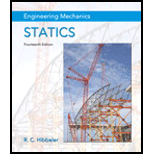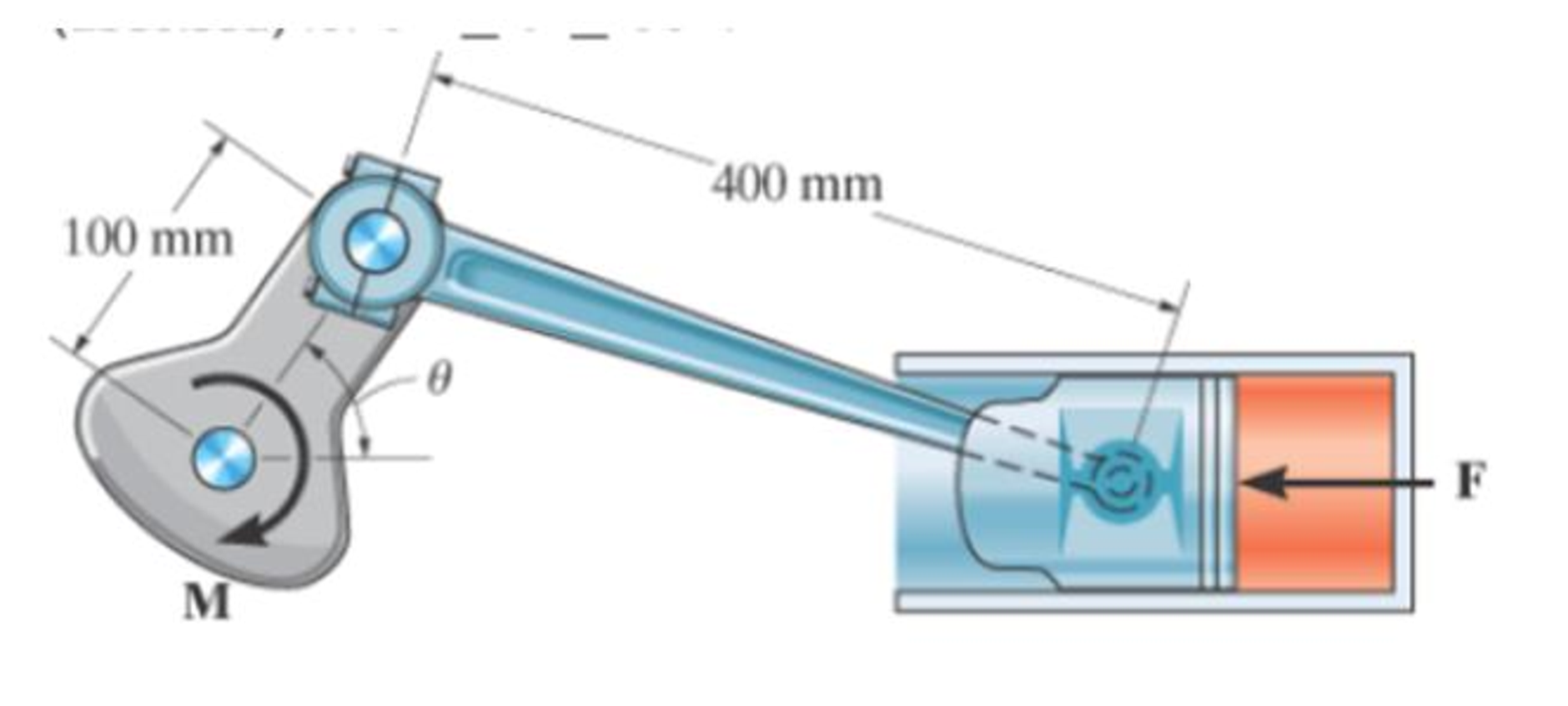
INTERNATIONAL EDITION---Engineering Mechanics: Statics, 14th edition (SI unit)
14th Edition
ISBN: 9780133918922
Author: Russell C. Hibbeler
Publisher: PEARSON
expand_more
expand_more
format_list_bulleted
Textbook Question
Chapter 11.3, Problem 20P
Determine the horizontal compressive force F applied to the piston for equilibrium when θ = 60°.

Expert Solution & Answer
Want to see the full answer?
Check out a sample textbook solution
Students have asked these similar questions
State the following laws a) v/t = constant, (b) pv=constant c) pv^n=constant
Define Gas Constant and Universal Gas Constant
state Boyle's Law.
A receiver contains 0.25 m³ of air at a pressure of 1700 kPa and a temperature of 18 ° C . Calculate the final pressure after 2.5 kg of air is added if the final temperature is 20.5 ° C . Take R for air = 0.287 kJ / kg / ° K
Chapter 11 Solutions
INTERNATIONAL EDITION---Engineering Mechanics: Statics, 14th edition (SI unit)
Ch. 11.3 - Each link has a mass of 20 kg.Ch. 11.3 - Determine the magnitude of force P required to...Ch. 11.3 - Determine the angle for equilibrium. The spring...Ch. 11.3 - Determine the angle for equilibrium. The spring...Ch. 11.3 - Prob. 5FPCh. 11.3 - Determine the angle for equilibrium. The spring...Ch. 11.3 - The lamp weighs 10 lb.Ch. 11.3 - Each of the four links has a length L and is pin...Ch. 11.3 - Determine the force screw exerts on the cork of...Ch. 11.3 - Determine the disks rotation if the end of the...
Ch. 11.3 - Prob. 5PCh. 11.3 - Prob. 6PCh. 11.3 - if the uniform inks AB and CD each weigh 10 lb....Ch. 11.3 - If the unstretched length of the spring is I0,...Ch. 11.3 - It vertical forces P1 = P2 = 30 lb act at C and E...Ch. 11.3 - Prob. 10PCh. 11.3 - The spring which always remains vertical. Is...Ch. 11.3 - Prob. 12PCh. 11.3 - Prob. 13PCh. 11.3 - Prob. 14PCh. 11.3 - Prob. 15PCh. 11.3 - Prob. 16PCh. 11.3 - Prob. 17PCh. 11.3 - Determine the angle for equilibrium. The spring...Ch. 11.3 - Determine the stillness k of the spring for...Ch. 11.3 - Determine the horizontal compressive force F...Ch. 11.3 - Prob. 21PCh. 11.3 - Prob. 22PCh. 11.3 - The lever is in balance when the load and block...Ch. 11.3 - If the load F weighs 20 lb and the block G weighs...Ch. 11.3 - Determine the force in the hydraulic cylinder...Ch. 11.7 - Determine the equilibrium positions and...Ch. 11.7 - Prob. 27PCh. 11.7 - If the potential function for a conservative...Ch. 11.7 - Prob. 29PCh. 11.7 - Prob. 30PCh. 11.7 - The rod BD, having negligible weight, passes...Ch. 11.7 - Determine the angle for equilibrium when a weight...Ch. 11.7 - Determine the angle for equilibrium and...Ch. 11.7 - Prob. 34PCh. 11.7 - Prob. 35PCh. 11.7 - The bars each have a mass of 3 Kg one the...Ch. 11.7 - The bars each have a mass of 10 kg and the spring...Ch. 11.7 - Determine the required stiffness k of the spring...Ch. 11.7 - It is unstretched when the rod assembly is in the...Ch. 11.7 - Determine the minimum distance d in order for it...Ch. 11.7 - If the spring is unstretched when = 60. Determine...Ch. 11.7 - The contact at A is smooth, end both are pm...Ch. 11.7 - Determine the steepest grade along which it can...Ch. 11.7 - Determine the weight W2, that is on the pan in...Ch. 11.7 - If the rod is supported by a smooth slider block...Ch. 11.7 - Point C is coincident with B when OA is...Ch. 11.7 - Prob. 47PCh. 11.7 - Prob. 48PCh. 11.7 - If the block has three equal sides of length d,...Ch. 11.7 - Prob. 1RPCh. 11.7 - Determine the horizontal force P required to hold...Ch. 11.7 - Prob. 3RPCh. 11.7 - Prob. 4RPCh. 11.7 - Prob. 5RPCh. 11.7 - Prob. 6RPCh. 11.7 - If both spring DE and BC are unstretched when =...Ch. 11.7 - Prob. 8RP
Knowledge Booster
Learn more about
Need a deep-dive on the concept behind this application? Look no further. Learn more about this topic, mechanical-engineering and related others by exploring similar questions and additional content below.Similar questions
- Heat energy is transferred to 1.36 kg of air which causes its temperature to increase from 40" CO 468°C. Calculate, for the two separate cases of heat transfer at (a) constant volume, (b) constant pressure: the quantity of heat energy transferred, (ii) the external work done, (iii) the increase in internal energy. Take cv and cp as 0.718 and 1.005 kJ/kgK respectivelyarrow_forwardA flat circular plate is 500 mm diameter. Calculate the theoretical quantity or heat radiated per hour when its temperature is 215°C and the temperature of its surrounds is 45°C. Take the value of the radiation constant to be 5.67 × 10^11 kJ/m2s K4.arrow_forwardDescribe Atmospheric Air and how it reacts with carbon in combustionarrow_forward
- 0.5 kg of ice at —5°C is put into a vessel containing 1.8kg of water at 17°C and mixed together, the result being a mixture of ice and water at 0°C. Calculate the final masses of ice and water, taking the water equivalent of the vessel to be 0.148 kg, specific heat of ice 2.04 kilkg K and latent heat of fusion 335 kJ/kg.arrow_forwardA condenser vacuum gauge reads 715 mmHg when the barometer stands at 757 mmHg. State the absolute pressure in the condenser in kN/m2 and bars.arrow_forwardSketch and Describe a timing diagram for a 2 stroke diesel enginearrow_forward
- Manipulate the formula for converting temperature from Fahrenheit to Celsiusarrow_forwardDefine Temperature, Pressure, and Absolute Temperature.arrow_forwardAn air reservoir contains 20 kg of air at 3200 kN/m2 gauge and 16°C. Calculate the new pressure and heat energy transfer if the air is heated to 35°C. Neglect any expansion of the reservoir, take R for air = 0.287 kJ/kgK, specific heat at constant volume c, = 0.718 kJFg K, and atmospheric pressure = 100 kN/m2arrow_forward
arrow_back_ios
SEE MORE QUESTIONS
arrow_forward_ios
Recommended textbooks for you
 International Edition---engineering Mechanics: St...Mechanical EngineeringISBN:9781305501607Author:Andrew Pytel And Jaan KiusalaasPublisher:CENGAGE L
International Edition---engineering Mechanics: St...Mechanical EngineeringISBN:9781305501607Author:Andrew Pytel And Jaan KiusalaasPublisher:CENGAGE L

International Edition---engineering Mechanics: St...
Mechanical Engineering
ISBN:9781305501607
Author:Andrew Pytel And Jaan Kiusalaas
Publisher:CENGAGE L
How to balance a see saw using moments example problem; Author: Engineer4Free;https://www.youtube.com/watch?v=d7tX37j-iHU;License: Standard Youtube License